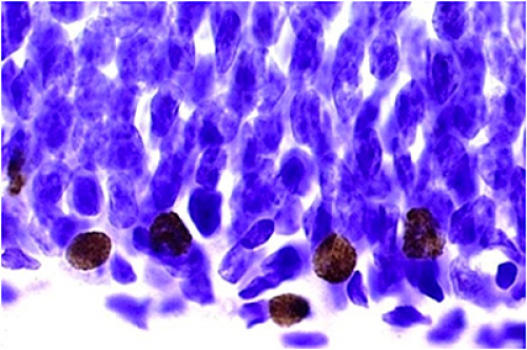Exercise Changes The Brain To Be More Resilient To Stress

According to a recent study published in the Journal of Neuroscience exercise changes the way the brain responds to stress and reduces the likelihood of anxiety interfering with normal brain function.
The researchers found that mice allowed to ‘exercise’ responded differently to stress. When exposed to a stressor their brains showed a rise in the action of neurons that stifle excitability in the region of the brain responsible for regulating anxiety.

Running produced a large increase in the number of new neurons in the hippocampus — a brain region shown to regulate anxiety — of a mouse that ran for six weeks (left). The brown cells are new neurons which are more numerous in active mice than sedentary mice, and the blue cells are mature neurons
These new findings may help explain the discrepancy in earlier research that showed that physical exercise lowers anxiety at the same time it boosts growth of new neurons in the ventral hippocampus. Newer neurons are generally more prone to excitement, so it should follow that exercise creates increased anxiety. The Princeton University team discovered that exercise also strengthens the process that stops those cells from firing.
Researcher and senior author Elizabeth Gould said the impact of exercise on the ventral hippocampus hasn’t been thoroughly explored.
For the research, a group of mice were allowed to use an exercise wheel as often as they wanted. Another group of mice was denied use of an exercise wheel. Given the opportunity, mice will generally run about two and a half miles a night (four kilometers).
Six weeks into the experiment, the mice were briefly exposed to cold water to induce stress. The brains of the two groups of mice reacted differently at the onset.
In the mice that hadn’t exercised, the cold water activated an increase in “immediate early genes.” These short-lived genes are rapidly turned on when neurons fire. The lack of these genes in the neurons of active mice suggested that their brain cells didn’t jump into an excitable state when stressed.
The brains of the active mice experienced an increase in the inhibitory neurons that keep excitable neurons under control. Neurons in those mice also released more gamma-aminobutyric acid (GABA), a neurotransmitter that suppresses neural excitement. Additionally, the protein that bundles GABA into vesicles for release into the synapse occurred higher amounts in the active mice.
When researchers blocked GABA receptors, the anxiety-reducing effect of physical activity was canceled out.
"Understanding how the brain regulates anxious behavior gives us potential clues about helping people with anxiety disorders. It also tells us something about how the brain modifies itself to respond optimally to its own environment," said Gould.
Anxious behavior may have had an evolutionary advantage for less physically fit creatures, allowing them to avoid danger and have a better chance of survival. This study shows that the brain has the ability to adapt and tailor its processes to lifestyle or surroundings, explains Gould.
The study is published in the Journal of Neuroscience and was part of first author Timothy Schoenfeld’s graduate dissertation. Schoenfeld is currently a postdoctoral fellow at the National Institute of Mental Health. Pedro Rada and Pedro Pieruzzini of the University of Los Andes in Venezuela co-authored. Elizabeth Gould is Professor of Psychology, Princeton Neuroscience Institute.
Journal Reference
- T. J. Schoenfeld, P. Rada, P. R. Pieruzzini, B. Hsueh, E. Gould. Physical Exercise Prevents Stress-Induced Activation of Granule Neurons and Enhances Local Inhibitory Mechanisms in the Dentate Gyrus. Journal of Neuroscience, 2013; 33 (18): 7770 DOI:10.1523/JNEUROSCI.5352-12.2013



